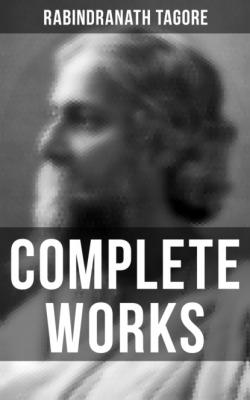ТОП просматриваемых книг сайта:
Complete Works. Rabindranath Tagore
Читать онлайн.Название Complete Works
Год выпуска 0
isbn 4064066396046
Автор произведения Rabindranath Tagore
Жанр Языкознание
Издательство Bookwire
further away, and seek Him in vain with tears.
Where He is far off, there He is unattainable: where He is near,
He is very bliss.
Kabîr says: "Lest His servant should suffer pain He pervades him
through and through."
Know yourself then, O Kabîr; for He is in you from head to foot.
Sing with gladness, and keep your seat unmoved within your heart.
LXXIX
III. 66. nâ main dharmî nahîn adharmî
I am neither pious nor ungodly, I live neither by law nor by
sense,
I am neither a speaker nor hearer, I am neither a servant nor
master, I am neither bond nor free,
I am neither detached nor attached.
I am far from none: I am near to none.
I shall go neither to hell nor to heaven.
I do all works; yet I am apart from all works.
Few comprehend my meaning: he who can comprehend it, he sits
unmoved.
Kabîr seeks neither to establish nor to destroy.
LXXX
III. 69. satta nâm hai sab ten nyârâ
The true Name is like none other name!
The distinction of the Conditioned from the Unconditioned is but
a word:
The Unconditioned is the seed, the Conditioned is the flower and
the fruit.
Knowledge is the branch, and the Name is the root.
Look, and see where the root is: happiness shall be yours when
you come to the root.
The root will lead you to the branch, the leaf, the flower, and
the fruit:
It is the encounter with the Lord, it is the attainment of bliss,
it is the reconciliation of the Conditioned and the
Unconditioned.
LXXXI
III. 74. pratham ek jo âpai âp
In the beginning was He alone, sufficient unto Himself: the
formless, colourless, and unconditioned Being.
Then was there neither beginning, middle, nor end;
Then were no eyes, no darkness, no light;
Then were no ground, air, nor sky; no fire, water, nor earth; no
rivers like the Ganges and the Jumna, no seas, oceans, and waves.
Then was neither vice nor virtue; scriptures there were not, as
the Vedas and Puranas, nor as the Koran.
Kabîr ponders in his mind and says, "Then was there no activity:
the Supreme Being remained merged in the unknown depths of His
own self."
The Guru neither eats nor drinks, neither lives nor dies:
Neither has He form, line, colour, nor vesture.
He who has neither caste nor clan nor anything else—how may I
describe His glory?
He has neither form nor formlessness,
He has no name,
He has neither colour nor colourlessness,
He has no dwelling-place.
LXXXII
III. 76. kahain Kabîr vicâr ke
Kabîr ponders and says: "He who has neither caste nor country,
who is formless and without quality, fills all space."
The Creator brought into being the Game of Joy: and from the word
Om the Creation sprang.
The earth is His joy; His joy is the sky;
His joy is the flashing of the sun and the moon;
His joy is the beginning, the middle, and the end;
His joy is eyes, darkness, and light.
Oceans and waves are His joy: His joy the Sarasvati, the Jumna,
and the Ganges.
The Guru is One: and life and death., union and separation, are
all His plays of joy!
His play the land and water, the whole universe!
His play the earth and the sky!
In play is the Creation spread out, in play it is established.
The whole world, says Kabîr, rests in His play, yet still the
Player remains unknown.
LXXXIII
III. 84. jhî jhî jantar bâjai
The harp gives forth murmurous music; and the dance goes on
without hands and feet.
It is played without fingers, it is heard without ears: for He is
the ear, and He is the listener.
The gate is locked, but within there is fragrance: and there the
meeting is seen of none.
The wise shall understand it.
LXXXIV
III. 89. mor phakîrwâ mângi jây
The Beggar goes a-begging, but
I could not even catch sight of Him:
And what shall I beg of the Beggar He gives without my asking.
Kabîr says: "I am His own: now let that befall which may befall!"
LXXXV
III. 90. naihar se jiyarâ phât re
My heart cries aloud for the house of my lover; the open road and
the shelter of a roof are all one to her who has lost the city
of her husband.
My heart

